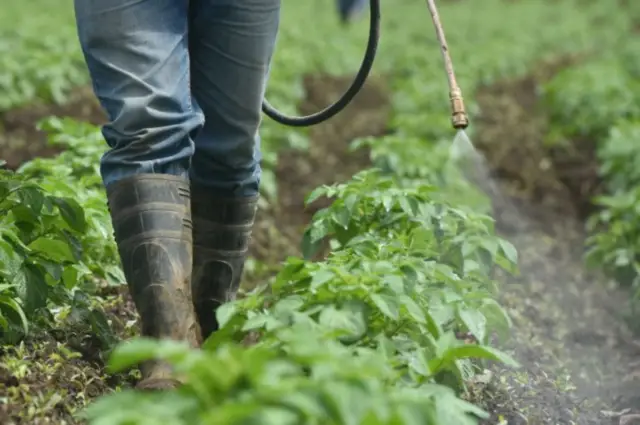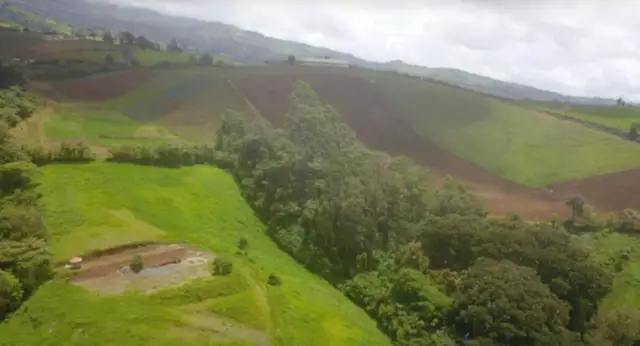A few days ago, the organization Bloque Verde, referred to the Environmental Performance Index, carried out by the North American universities of Yale and Columbia, analyzing 180 countries in terms of climate change, environmental health and vitality of ecosystems.
The index reports 40 performance indicators in more than 11 categories and Costa Rica is in position 68, well below what would be expected. It turns out that the country is ranked 96th in agrochemical risk management and 156th in efficiency of fertilizer use.
It is worth noting that in the Central American country, 133 agrochemicals considered highly dangerous due to their implications for health and the environment are still being used, such as paraquat and methamidophos, an insecticide that is prohibited in 102 countries.

According to the recent UNDP report on the use of pesticides in the country, it reveals that 93% of the agropoisons used in Costa Rica are Highly Hazardous Pesticides (HHP).
Residents of Cipreses, Cartago demand greater responsibility for pollution
A group of residents of Cipreses de Cartago organized in the Ecological Front ECOCIPRESES, emphasized the “lack of responsibility” of engineer Roberto Guzmán Gutiérrez, president of the Costa Rican Institute of Aqueducts and Sewers (AYA). In the opinion of the neighbors, without thoroughly studying the issue of water contamination in Cipreses de Cartago, the engineer issued a public statement and also an official letter that “makes others feel sorry.”
This problem is already about 2 years old and today it has a greater impact, due to the public health consequences that the community may be suffering from the supply of the ASADA with products of the degradation of the agrochemical chlorothalonil, according to the Ecological Front, the fungicide is one of the most used in Costa Rica and in the Carthage region.
The Plantón spring, in Cipreses, in Oreamuno de Cartago, is an example of the problem and is surrounded by agricultural fields where the use of agrochemicals is intense.

The Minister of Health has also commented on the subject
The Minister of Health, Joselyn Chacón, asked AYA some time ago to investigate degradation products of the agrochemical chlorothalonil in the water of Cipreses. She requested a measurement plan to analyze chlorothalonil degradation molecules in aqueducts that may be contaminated in Costa Rica.
Subsequently, the Minister asked AYA to include the products derived from chlorothalonil in the measurements made by the National Water Laboratory, because “the entity has publicly recognized that it does not have the capacity to detect them.”
FECON position
The Fecon organization, represented by Henry Picado, highlighted that the IRET of the National University had the detection capacity on 4 occasions since 2020, “a sample was even sent to the Swiss EAWAG laboratory (Swiss Federal Institute of Aquatic Science and Technology) and found the presence of thirteen chlorothalonil degradation products”.
In addition, they say that after the findings “the AYA has dedicated itself to distorting and disguising the evidence with technicality so as not to comply with the precautionary principle

For many it is known that chlorothalonil has not been authorized in the European Union since March 2019, due to the risks that this agrochemical presents for environmental health.
For the aforementioned organization, ECOCIPRESES, it is important to inform the population that the fungicide, which is the second most used in Costa Rica, is considered highly dangerous and among the effects on human health that it causes, liver problems and kidney failure stand out. Furthermore, it is classified as a carcinogenic product, according to the Final Renewal report for the active substance chlorothalonil, published in 2019 by the General Directorate for Health and Food Safety of the European Union.
Finally, the Cartago organization called on the Government of the Republic and especially the Presidency of AyA to strengthen the National Water Laboratory with resources, infrastructure and personnel. “How is it possible that the National Water Laboratory can only analyze the presence of 24 pesticides in drinking water (the well-known N4 analysis)? When there are more than 200 registered pesticides in the country and according to the recent UNDP report there are 161 highly dangerous molecules.

For those who have experienced shifts in consciousness and know that more peace, joy, and love awaits in a better living environment. A bold shared vision. A living community and hub for innovation. A sustainable ecosystem for living and working. A model for the new future.
